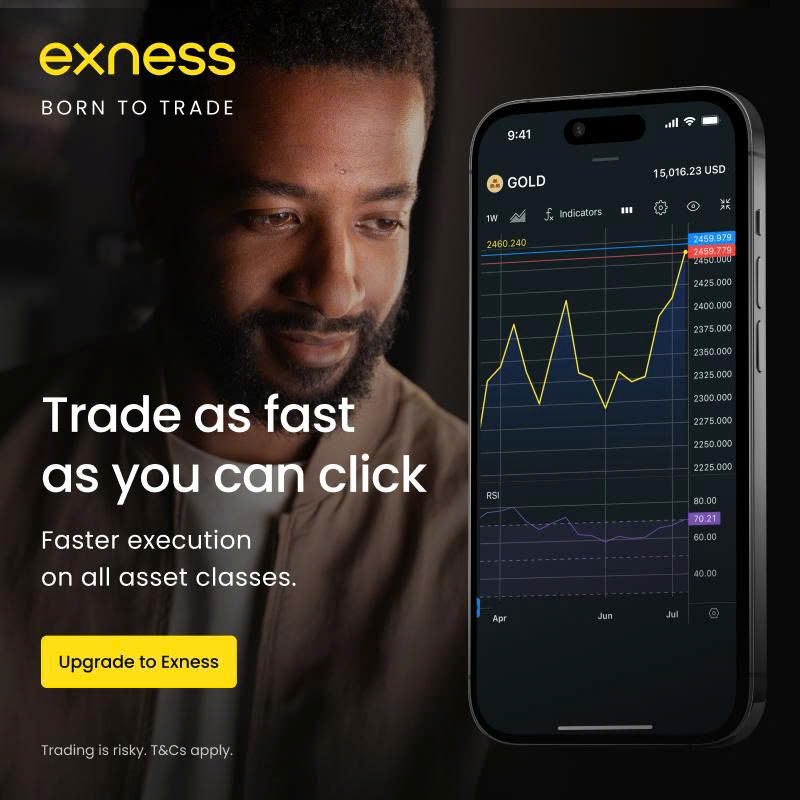
8 minute read
Is Forex Trading Legal in Zambia? A Comprehensive Guide
from Forex Zambia
Yes, forex trading is legal in Zambia! If you’re a Zambian looking to dive into the world of foreign exchange (forex) trading, you’re in the right place. The idea of trading currencies to make a profit can sound exciting but also a bit intimidating, especially when you’re unsure about the legal landscape. Don’t worry—I’ve got you covered with this easy-to-read guide that answers your burning questions about forex trading in Zambia, its legality, and how to get started safely. Let’s break it down step by step, so you can trade with confidence.
Top 4 Best Forex Brokers in Zambia
1️⃣ Exness: Open An Account or Visit Brokers 🏆
2️⃣ XM: Open An Account or Visit Brokers 💥
3️⃣ JustMarkets: Open An Account or Visit Brokers ✅
4️⃣ Quotex: Open An Account or Visit Brokers 🌐
Understanding Forex Trading: What’s It All About?
Before we dive into the legal stuff, let’s quickly clarify what forex trading is. Forex, short for foreign exchange, involves buying and selling currencies to profit from changes in their exchange rates. Think of it like this: you buy euros with Zambian Kwacha (ZMW) when you think the euro will get stronger, then sell it back for a profit when its value rises. The forex market is massive—over $7.5 trillion is traded daily worldwide—and it operates 24/5, making it super accessible for Zambians.
But is it okay to trade forex in Zambia? Let’s get to the heart of the matter.
The Legal Status of Forex Trading in Zambia
Forex trading is 100% legal in Zambia, provided you follow the rules set by the country’s financial authorities. The Bank of Zambia (BoZ) and the Securities and Exchange Commission (SEC) oversee the financial markets, including forex trading. These bodies ensure that trading is conducted transparently and ethically, protecting traders from scams and fraud. However, there’s a catch: Zambia doesn’t have locally regulated forex brokers. This means Zambian traders typically use international brokers, which is perfectly fine as long as those brokers are regulated by reputable global authorities like the UK’s Financial Conduct Authority (FCA), Australia’s ASIC, or Cyprus’s CySEC.
In 2021, the Bank of Zambia made a significant move by lifting some foreign exchange restrictions, making it easier for Zambians to move money in and out of the country for trading. This liberalization has opened doors for both local and international traders, boosting Zambia’s participation in global forex markets. So, whether you’re trading USD/ZMW or EUR/USD, you’re on solid legal ground as long as you use a regulated broker and comply with local laws.
Why Is Regulation So Important?
You might be wondering, “Why all the fuss about regulation?” Well, regulation is your safety net. A regulated broker has to follow strict rules, like keeping your funds in segregated accounts (separate from their own money) and providing transparent trading conditions. This protects you from losing your money if the broker goes bust or tries to pull a fast one. Unregulated brokers, on the other hand, are a big red flag—they might promise huge profits but could disappear with your cash.
For Zambian traders, sticking with brokers regulated by top-tier authorities ensures your funds are secure and you have legal recourse if something goes wrong. Popular brokers like XM, Pepperstone, and Exness are well-regulated and widely used by Zambians. Always verify a broker’s license before signing up—check their website or contact the regulator directly.
Key Legal Considerations for Zambian Traders
While forex trading is legal, there are a few things you need to keep in mind to stay compliant:
1. Tax Compliance: Forex profits in Zambia are subject to taxation, either as business income or capital gains tax. You’ll need to report your earnings to the Zambia Revenue Authority (ZRA). Not sure how to handle this? Consult a tax professional to avoid any hiccups.
2. Anti-Money Laundering (AML) Rules: The BoZ monitors large forex transactions to prevent money laundering. If you’re moving big sums, you might need to report them to the authorities. This is standard practice to keep the financial system clean.
3. Avoid Scams: Unfortunately, forex scams are real. If a broker promises “guaranteed profits” or pressures you to invest quickly, run the other way. Stick to regulated platforms and report suspicious schemes to the SEC or BoZ.
By following these guidelines, you can trade forex legally and safely in Zambia without any headaches.
Why Zambians Are Jumping Into Forex Trading
Forex trading is booming in Zambia, and it’s easy to see why. With the economy heavily tied to copper exports and agriculture, the Zambian Kwacha (ZMW) can be quite volatile, creating opportunities for traders to profit from price swings. Plus, improvements in internet connectivity and financial literacy have made it easier for Zambians, especially millennials and Gen Z, to access global markets.
Here are a few reasons why forex trading is gaining traction in Zambia:
· Low Entry Barrier: You can start trading with as little as $5 or $10 with some brokers, making it accessible for beginners.
· Flexibility: The forex market is open 24 hours a day, so you can trade around your schedule, whether you’re in Lusaka or Ndola.
· Diversification: Trading forex allows Zambians to diversify their income beyond traditional sectors like mining or farming.
· Global Access: You can trade major currency pairs like EUR/USD or even ZMW pairs (though these are less common) and tap into international markets.

✅ Trade with Exness now: Open An Account or Visit Brokers 👈
How to Start Forex Trading in Zambia Safely
Ready to give forex trading a shot? Here’s a step-by-step guide to get you started without breaking any laws or risking your savings:
1. Educate Yourself
Forex trading isn’t a get-rich-quick scheme—it takes knowledge and discipline. Start by learning the basics: what are pips, leverage, spreads, and margin? Free resources like “Currency Trading for Dummies” or online courses from platforms like Wealthway FX can help. Many brokers also offer webinars and tutorials tailored for Zambians.
2. Choose a Regulated Broker
Pick a broker regulated by a reputable authority. Some great options for Zambians include:
XM: Offers over 55 currency pairs and user-friendly platforms like MetaTrader 4 (MT4).
Pepperstone: Known for low spreads and fast withdrawals, regulated by FCA and ASIC.
Exness: Supports Zambian bank transfers and has tight spreads.
Check the broker’s regulation status, read reviews, and test their customer support before depositing money.
3. Open a Demo Account
Most brokers offer demo accounts where you can practice trading with virtual money. This is a risk-free way to get familiar with the trading platform and test your strategies. Spend a few weeks on a demo account before going live.
4. Fund Your Account
Once you’re ready, deposit funds using methods like bank transfers or mobile payments (some brokers support ZMW deposits to avoid conversion fees). Start small—$100 or less is fine for beginners.
5. Develop a Trading Plan
A solid plan includes your risk tolerance, profit goals, and trading strategy. Use tools like stop-loss orders to limit losses and avoid high-leverage trading, which can wipe out your account if the market moves against you.
6. Stay Informed
Keep an eye on global financial news, as events like U.S. interest rate changes or copper price fluctuations can impact currency pairs. The London-New York session overlap (2 PM–6 PM Zambian time) is often the best time to trade due to high market liquidity.
Challenges Zambian Traders Face
While forex trading is legal and full of potential, it’s not without challenges:
Limited Local Brokers: Since Zambia lacks SEC-regulated brokers, you’ll rely on international platforms, which can sometimes have higher fees for ZMW conversions.
Volatility: The Zambian Kwacha’s value can swing wildly due to copper prices or political events, making ZMW pairs riskier.
Scams: Unregulated brokers and “get-rich-quick” schemes are common. Always verify a broker’s credentials.
Tips for Success in Forex Trading
To wrap things up, here are some quick tips to help you succeed:
Start Small: Don’t risk more than you can afford to lose.
Stay Disciplined: Stick to your trading plan and avoid emotional decisions.
Keep Learning: Join trading communities, attend webinars, and read market analyses to stay sharp.
Be Patient: Forex trading takes time to master. Don’t expect overnight riches.
Conclusion: Trade Smart, Trade Legal
Forex trading is not only legal in Zambia but also a fantastic opportunity to diversify your income and tap into global markets. By choosing a regulated broker, educating yourself, and following local laws like tax compliance, you can trade with confidence. The key is to start small, practice with a demo account, and stay disciplined. With Zambia’s growing economy and improving internet access, now’s a great time to explore forex trading—just make sure you do it the smart way.
✅ Trade with Exness now: Open An Account or Visit Brokers 👈
Read more:

